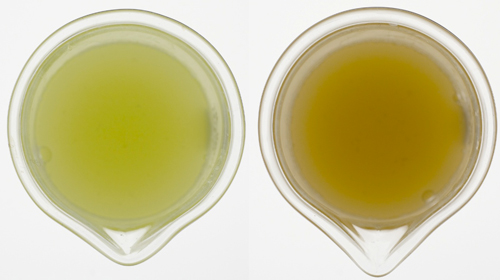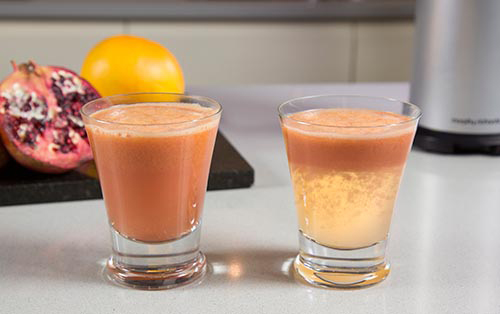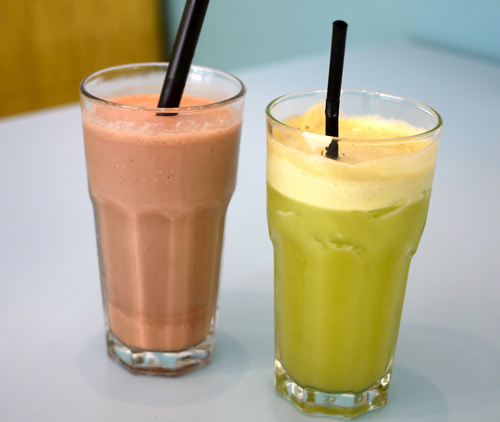Why does fresh fruit juice discolor?
Fresh fruit juice or vegetable juice contains high-activity phenolase, which will be released when the cells are destroyed. Then the phenolase will contact with the oxygen in the air and make the polyphenol and vitamin C oxidized, so that the fruit juice turns brown.
For this reason, when we put a fresh fruit juice in open air for several minutes, its color can easily turn dark. The discoloration is more fast for apple and banana juice. You can observe the color difference after only 1 minute.
On the other hand, the fruit juice made of essence, pigment, sugar and acid hardly has color degradation. So, if you buy a cup of fruit juice in a store and it doesn't discolor after half an hour, you can be certain it is not pure fresh fruit juice.

Why does fresh fruit juice stratify?
Fresh fruit juice usually divides into layers after a while of standing. The upper and lower color look different. And the taste is not good.
Usually, the density of fruits is lower than water. When we are washing fruits, they float on the water. After extraction, the light fruit cellulose will float in the upper part of water. This is why fresh fruit juice is divided into layers.
If the fresh fruit juice still looks thick and uniform after several hours, it may have been added with thickener. If there is no thickener, the fruit juice will easily stratify quickly and taste bad. This is why thickener is an important ingredient in fruit juice. Pectin is a frequently used thickener. It can make all ingredients in fruit juice suspend uniformly, so that it tastes mellow and smooth.

Why some fresh fruit juice doesn't stratify?
Some fresh fruit juice doesn't stratify, because the juicer only reserve the liquid and filter out the fibers. As it has separated the pomace and juice, they will not stratify in cups. But in this way, most fruit flesh and dietary fibers will be removed, so the nutritive value is low.
How to prevent the discoloration and stratification of fruit juice?
How can we slow down the oxidation of fresh fruit juice? And how can we prevent stratification without adding thickener or removing pomace?
- When making fruit juice, we can use milk or yoghurt to take the place of water. These media has higher stickiness. When they are mixed with fruit juice, they will hard to stratify.
- Add some lemon juice to the fruit juice you are extracting. Lemon juice is regarded as an universal and healthy seasoner. It contains rich organic acid and vitamin C, with strong bactericidal effect. It can slow down the oxidation of fresh fruit juice.
- You can also add some walnut, cashew, flaxseed and other dry fruits with high oil content to the fruit juice. The oil has lower density, so the fruit juice will be hard to stratify.
- Besides, carrot and broccoli juice contains β carotene, it will transform into Vitamin A in our body. Vitamin A is a kind of fat-soluble vitamin. If we heat the carrots and broccoli and crush them together with some dry fruits. The vitamin A will be easier for human body to absorb. Therefore, it is a good idea to add some dry fruits when making vegetable juice.
- Pueraria starch is a specialized stabilizer for fresh fruit juice. It can effectively prevent the oxidation, discoloration and stratification of fresh fruit juice, and slow down the nutrition loss. Nowadays, pueraria starch is an indispensible additive in making fresh fruit juice. Pueraria starch is extracted from natural Pueraria Lobata, which has high medicinal value.

Can we drink stratified or discolored fruit juice?
Of course we can. Discoloration means some of its vitamins are oxidized and some nutrition get lost. And the taste is poor than fresh juice. But oxidation and discoloration doesn't generate harmful substance. You can drink it as before. But the oxidized fruit juice looks ugly, and the taste is not good. So you’d better drink freshly squeezed fruit juice.

